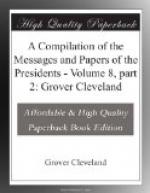A perusal of the convention now submitted will suffice to show how fully it carries out the policy of intercourse thus announced. I commend it to you in the confident expectation that it will receive your sanction.
It does not seem necessary to my present purpose to enter into detailed consideration of the many immediate and prospective advantages which will flow from this convention to our productions and our shipping interests.
CHESTER A. ARTHUR.
EXECUTIVE MANSION, Washington, December 10, 1884.
To the Senate of the United States:
I transmit herewith to the Senate, for consideration with a view to ratification, a treaty signed on the 1st of December with the Republic of Nicaragua, providing for the construction of an interoceanic canal across the territory of that State.
The negotiation of this treaty was entered upon under a conviction that it was imperatively demanded by the present and future political and material interests of the United States.
The establishment of water communication between the Atlantic and Pacific coasts of the Union is a necessity, the accomplishment of which, however, within the territory of the United States is a physical impossibility. While the enterprise of our citizens has responded to the duty of creating means of speedy transit by rail between the two oceans, these great achievements are inadequate to supply a most important requisite of national union and prosperity.
For all maritime purposes the States upon the Pacific are more distant from those upon the Atlantic than if separated by either ocean alone. Europe and Africa are nearer to New York, and Asia nearer to California, than are these two great States to each other by sea. Weeks of steam voyage or months under sail are consumed in the passage around the Horn, with the disadvantage of traversing tempestuous waters or risking the navigation of the Straits of Magellan.
A nation like ours can not rest satisfied with such a separation of its mutually dependent members. We possess an ocean border of considerably over 10,000 miles on the Atlantic and Gulf of Mexico, and, including Alaska, of some 10,000 miles on the Pacific. Within a generation the western coast has developed into an empire, with a large and rapidly growing population, with vast, but partially developed, resources. At the present rate of increase the end of the century will see us a commonwealth of perhaps nearly 100,000,000 inhabitants, of which the West should have a considerably larger and richer proportion than now. Forming one nation in interests and aims, the East and the West are more widely disjoined for all purposes of direct and economical intercourse by water and of national defense against maritime aggression than are most of the colonies of other powers from their mother country.




